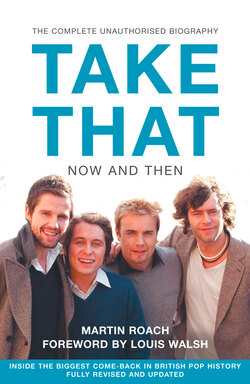Читать книгу Take That – Now and Then - Martin Roach - Страница 7
Introduction
ОглавлениеWithin twelve months of announcing their ‘reunion’ tour in late 2005, Take That had completed the biggest come-back in pop history. At the time of writing they can sell tickets faster than any other pop artist in the UK; they have topped the singles charts two more times and produced one of the biggest selling albums of the last decade; their own TV special enjoyed one of the highest ratings for an entertainment show in years…it seems there is no limit to what they can now achieve.
How have they done it?
On the surface, there are three key reasons. Firstly, the cultural impact from their original career has proved to have far longer lasting resonance than anyone—probably even the band themselves—realised. Pop is a fickle beast and for a band in that genre to have any lasting validity is unusual. Take That was not a pioneering fashion band, far from it. They were not musical innovators. They were certainly not the critics’ band of choice. Yet what the colossal success of their come-back tour tells us is that they clearly made an indelible mark on British music and cultural history. The broadsheets might not like to think so, but it is a fact. Among the thousands of bands that spilled out of the Nineties, the importance of the majority would fade with time. Take That’s legacy, however, was clearly a sleeping giant.
This pop behemoth was first awakened by an ITV1 documentary and then established on the high streets of Britain by a series of come-back shows that captured the nation’s imagination on an unprecedented scale. The band’s famously energetic and explosive original live shows have been surpassed by a new tour of stunning proportions. Filling some of the UK’s biggest venues was one thing, entertaining in them quite another. They did both with aplomb. Why would so many thousands of people chase tickets to see a band from their childhood? Partly because they wanted a good time; partly because the shows themselves were sensational; but mainly because to millions of people, Take That matter.
Finally, the band has produced an album of new material that is genuinely polished, well-crafted and hugely popular. A live show alone does not qualify Take That for the accolade of pop’s biggest come-back. Of course, nostalgia plays a part, but the band has brilliantly complemented this revival with a slew of superb new songs. Opening single ‘Patience’ was a new classic in the ‘Back For Good’ vein, while follow-up ‘Shine’ was an addictive curve-ball. Both were No. 1. The album, Beautiful World, silenced all but the very harshest of critics.
That, it appears, is how they have done it.
It is rare for a pop band to get a second bite of the cherry—rarer still for any come-back to have greater commercial potential than the first time around. That’s what Take That appear to have done. The biggest pop band of the Nineties can now add the biggest come-back in pop history to their list of achievements.
From childhood days in bedrooms writing songs, to thanking audiences of 60,000 in football stadiums over twenty years later, this is how it all happened…
Martin Roach March 2007
